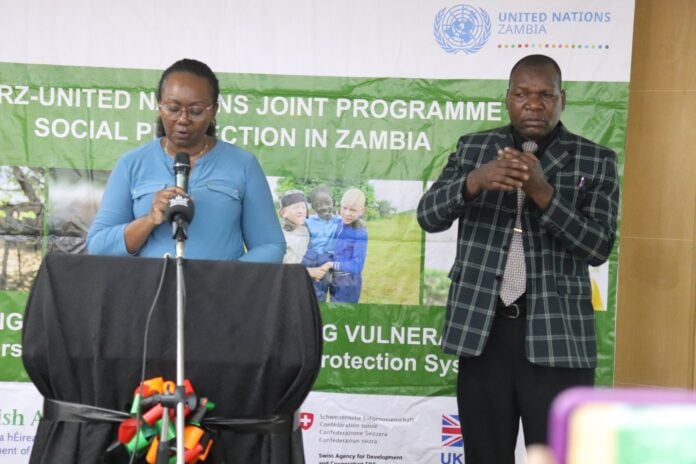
Government has reaffirmed its commitment to disability inclusion through the launch of three National Disability Reports aimed at addressing key challenges faced by persons living with disabilities.
Speaking during the launch in Lusaka , Ministry of Community Development and Social Services Permanent Secretary, Angela Kawandami, said the reports mark a major step forward in translating disability policies into tangible actions.
“It is a reaffirmation of government’s resolve to ensure that disability inclusion is not only a matter of policy pronouncement but is translated into tangible actions that positively transform lives. Today’s launch, therefore, signifies more than the presentation of research outputs,” said Ms Kawandami.
The reports launched include the Study on Albinism and Rights in Zambia, the Country Report on the Situation Analysis of Persons with Disabilities, and the Assistive Technology Assessment Report.
Ms Kawandami explained that the study on albinism draws attention to the unique vulnerabilities of persons with albinism, particularly the discrimination, stigma, and safety risks they face.
“It highlights the importance of strengthening legal and policy measures, as well as community-level awareness and protection mechanisms,” she said.
She further noted that the situation analysis report offers a comprehensive overview of the state of disability rights in Zambia, while identifying gaps in access to services, participation in development, and human rights realisation.
The third report, on assistive technology, sheds light on the urgent need to expand access to assistive devices.
“Without such tools, many persons with disabilities remain excluded from education, employment, healthcare, and other economic opportunities,” she added.
The Permanent Secretary stated that the findings of these reports would inform government programming, especially under the Eighth National Development Plan (8NDP), which prioritises equity and human development.
“We are particularly committed to strengthening policy frameworks, enhancing service delivery, promoting assistive technologies, and ensuring the meaningful participation of persons with disabilities,” she said.
Ms Kawandami emphasised that disability inclusion is not a matter of charity but of rights, dignity, and social justice.
“Persons with disabilities are equal citizens whose voices, skills and potential must be fully recognised in our national development,” she said.
Meanwhile, United Nations Resident Coordinator in Zambia, Beatrice Mutali, in a speech read on her behalf by UNICEF Country Representative, Nejimudin Bilal, said there is urgent need to protect persons with disabilities, especially those with albinism.
“We need to promote greater awareness of their rights through education, community engagement, and empowerment. The lives of persons with albinism matter. The lives and organisations that fight for their rights should not be left behind.” said Mr Bilal.
And Association for Blind Women Empowering and Nurturing Zambia Initiatives representative, Carol Kapungwe, called on the government to improve healthcare services.
“We need assistance devices such as sunscreen for persons with albinism and better healthcare access for all persons with disabilities,” she said.
The launch of the reports marks a critical step towards building a more inclusive and equitable society.

